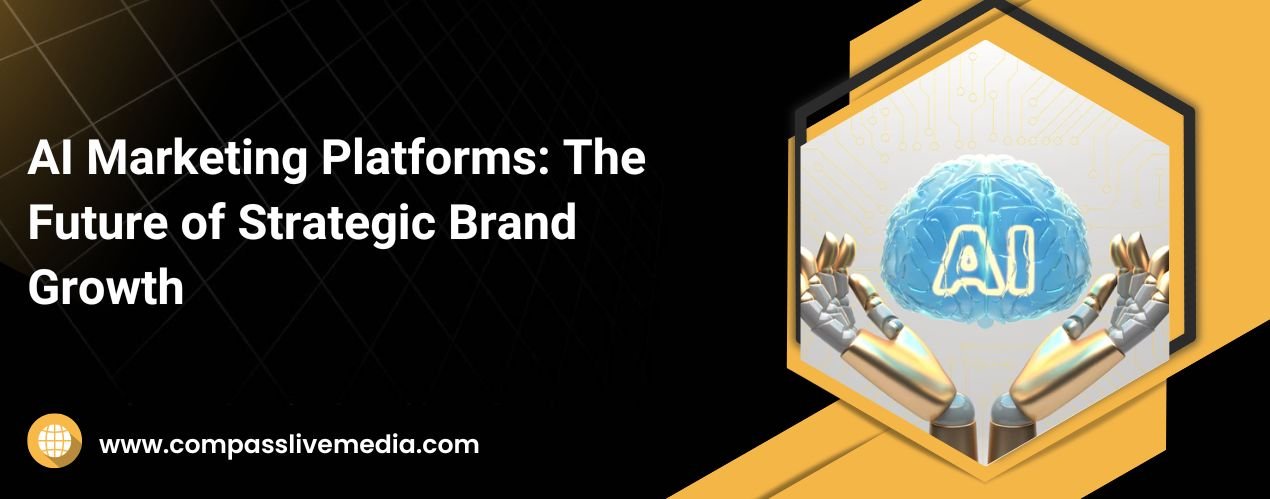Introduction
Thus, as marketing becomes increasingly complex and multi-faceted, the use of artificial intelligence platforms forms a brand new section in its development. Some organizations, such as Compass Live Media, situated in the United States of America, are using the benefits of information technology in the manner in which they are assisting firms in altering the guidelines of branding. The increasing use of these platforms is helping businesses discover incredible details and market their products with accuracy. As we move towards this topic, I see that it is evidently apparent that the course of strategic brand development is changing. With regards to the concept of this blog, it is focused on reporting on the subject of effective AI marketing platforms and the possible changes they provide to the field of branding.
What is AI (artificial intelligence) marketing?
AI marketing, also known as artificial intelligence marketing, is the implementation of advanced digital technologies like machine learning and big data in the improvement and integration of marketing functions. Marketing business through the application of AI can make better analytics of large datasets beneficial to helping firms improve their knowledge of their consumers, thereby making better marketing strategies. It can tell how they are going to interact with products, mere locations of placing advertisements, and might even generate the content based on those consumers. AI also facilitates the productivity that defines marketing efforts. AI marketing agency and services have a strategic role in boosting business viability with current technologies through the provision of effective solutions that generate good returns and customers’ satisfaction.
How does Artificial Intelligence (AI) work?
- Data Collection: AI marketing agencies input large amounts of information from social media, communication with customers, customer browsing habits, and customer background data.
- Data Analysis: By applying statistical models to the amassed data, AI systems are able to identify the patterns, trends, and insights that pertain to customers’s preferences, purchasing behavior, and the market as a whole.
- Unique Content: AI can also create a preference profile for the individual or a product preference profile for customers to be used in the recommendation system for content and products.
- Customer Engagement: By means of real-time customer interaction with the help of intelligent AI-based bots, the clients are provided with individual support, an instant response to possible questions, and are direct through properly specified steps to purchasing.
- Performance Tracking: Marketing campaign metrics supply business organizations with detailed analysis on the success of the campaigns, giving evaluative data on ROI and lessons from which they could learn to improve future campaigns.
- Competitive Advantage: First, through the insights and actions supported by AI, companies maximize their potential, which puts them ahead of other similar companies to serve consumers with marketing experiences that meet customers’ appreciation levels.
Benefits of AI Marketing in Digital Marketing
AI marketing service present several advantages in the form of digital marketing plans, particularly in fundamentals like analyst relations as well as compliance. First, they can combine data from different sources, observe possible patterns, and suggest ways to improve analyst relations, such as by studying market trends and competitors. Furthermore, AI capabilities allow marketers to keep up with legal requirements through regular supervision and the ability to modify marketing campaigns accordingly.
Furthermore, with the help of AI, marketing has become more customized, increasing the flow and satisfaction of customers as well as enhancing the targeting of advertisements with an increase in returns. The use of AI to perform uniform work eliminates the burden on marketers and increases the time they spend on strategy and creativity, leading to innovation in digital marketing campaigns. In general, AI helps organizations remain competitive in the context of digitalization while delivering useful, legal, and efficient advertising strategies.
The Future of AI in Marketing for Better Brand Strategies
AI becoming an integral part of marketing and brand strategies, which often affect analyst relations, will likely evolve in the following ways in the future: Big data tools enabled by artificial intelligence provide capabilities that allow for unprecedentedly large, formless data sets to be analyzed for patterns and trends in the market and consumers, as well as competitors. Through such findings, specific advertising nuances can be adjusted to the corresponding brand audience, helping a brand to occupy a unique position amidst constant market competition.
Also, AI brings predictive analysis to marketing because it will help marketers predict future trends and what they should do. Likely, more meaningful and appropriate marketing strategies can be developed to engage customers and gain better loyalty. In the future, AI will be integrated more and more into the corresponding trends, which will allow brands to establish meaningful links and create strong development for the years ahead thanks to new and effective solutions.
AI marketing strategies increase performance
- Automatic Checks: AI guarantees that every event in marketing occurs as intended and follows a set of predefined rules, checked automatically.
- Watch in real-time: Marketing also has the presence of an additional informant who monitors any rule-breaking activity immediately.
- Keep data safe: To ensure that customer information is safe, AI takes various measures, such as strong locks as well as guards, among others.
- Learn and improve: Self-organizing: thanks to learning from mistakes as well as successful marketing initiatives, this system becomes more efficient at ensuring marketing stays on course in the long run.
- Save time and effort: In the case of AI, firms do not need to spend a lot of time checking rules in detail so that we can save time in other important areas.
- Build Trust with Customers: When customers specify firms to implement rules and exercise data security, they gain confidence in such firms, consequently engendering better contracts.
How will artificial intelligence change the future of marketing?
In the future, marketing is likely to be more impacted by the capabilities of artificial intelligence than it already is. Marketing agencies and services that incorporate artificial intelligence present capabilities that can process large datasets that can help a business get closer to understanding its consumers than it has been capable of before. AI also improves consumer targeting by using predictive approaches in defining consumer behaviors, marketing campaigns, and advertising for increased success.
In addition, AI saves time by compliance regulatory repetitiveness, which can help marketers utilize their creativity and expertise more effectively. Due to its nature, AI will allow marketers to predict consumer trends and adjust their strategies as needed, since the key AI advantage is the ability to learn and change as desired. In the end, AI will invigorate the marketing industry by providing organizations with the tools necessary to push themselves forward and create more meaningful customer relationships.
Top 5 AI Marketing Tools to Grow Business in 2024
- Predis.ai
- ChatGPT
- Gemini
- HubSpot AI
- Copy.ai
FAQs
1. What is the future of branding with AI?
AI is transforming customer interaction and data analysis, enabling brands to predict consumer behavior, create personalized experiences, and engage customers with unique quickness.
2. How can AI help marketing strategy?
AI aids marketers in predicting campaign outcomes, helping them to create more dynamic campaigns that boost sales and ROI.
3. How does AI help social media marketing?
Artificial intelligence can leverage social media data to boost revenue by identifying engagement-boosting headlines, words, and images and identifying new audiences and trends through emotional analysis.


